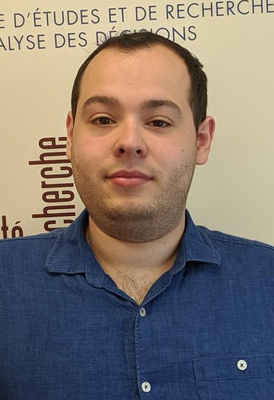Prospective Students
Studying at GERAD
First of all, GERAD does not recruit students directly. GERAD members themselves provide their students with access to our facilities and community. To study at GERAD, you must first identify one of our members, as well as a theme and a research topic, and then register at the university to which that member is attached. Naturally, you need to reach an agreement and find a way to awaken the interest of the researcher you are contacting, plus deal with all administrative and funding issues.
The best place to start is our directory, where you can search among our members to find out which ones have research interests that match yours. Then, contact them directly to discuss different possible scenarios. Our Job offers section also regularly lists projects that are actively seeking students at various levels.
Live in Montréal, a creative university city
Greater Montréal, which is North America’s second university city (after Boston) in terms of the number of students per capita, offers a stimulating environment for research-oriented studies.
It is Canada’s university capital, with 11 university institutions and 313,000 students, 58,000 from abroad.*
This multicultural metropolis also benefits from an ecosystem of innovative companies and is one of the world leaders in high value-added sectors.
*Data from the Interuniversity Cooperation Office (BCI), October 2023.
Profiles
Here are three profiles of our current students who explain just how they got to GERAD:
Sajad Aliakbari-Sani

I am a PhD candidate at GERAD and HEC Montréal, Department of Decision Sciences, where my advisors are professors Erick Delage and Olivier Bahn. I joined GERAD in August 2016. My research lies at the interface of decision making under uncertainty and energy systems planning. Specifically, in my PhD thesis, I am working on a robust integration of electric vehicle charging stations in smart grids’ capacity planning.
GERAD provided me with a unique opportunity to learn from and collaborate with the great academics there. Moreover, the international scientific reputation of this research group, especially in the field of optimization, helped me to develop my professional network. Before joining GERAD, I obtained my master’s degree in 2014 from the University of Tehran, Department of Industrial Engineering, where I focused on energy models and their applications for Iran’s energy system. After getting my PhD, I plan to deepen my research in two threads: 1) developing quantitative methodologies that manage risks and 2) applying them in industrial decision-making problems.
Mahdis Bayani

I am a PhD candidate at Polytechnique Montréal in the Mathematics and Industrial Engineering Department. In Iran, I earned a bachelor’s degree and a master’s degree in systems engineering at Amirkabir University of Technology (Tehran Polytechnic). I was supervised by M. H. Fazel Zarandi, Mostafa Moein and Abbas Seifi as I worked on topics of clustering algorithms for customer segmentation for my BSc project, and on a fuzzy neural network for disease diagnosis systems for my MSc thesis.
I started my PhD in GERAD under the supervision of Louis-Martin Rousseau and Yossiri Adulyasak. I am a member of the Canada Research Chair in Healthcare Analytics and Logistics (HANALOG) and Canada Research Chair in Supply Chain Analytics. For my PhD thesis, I am working on combining operations research and machine learning algorithms to improve solving quadratic combinatorial optimization problems.
Being a part of GERAD, one of the most outstanding research centres for operations research, has provided me with a platform to collaborate with resourceful researchers and professors. From the beginning of my PhD, I attended multiple workshops and seminars at GERAD which have been helpful to increase my expertise and improve my social skills. I also decided to get involved in GERAD by becoming its PhD students’ representative in October 2020.
After graduation, I would like to explore different opportunities in my career path where I can put into practice what I learned in the fields of algorithm design, optimization, and data science.
Alexis Montoison

I completed an engineering course in computer science and applied mathematics at the École nationale supérieure d’électrotechnique, d’électronique, d’informatique, d’hydraulique et des télécommunications (ENSEEIHT), in Toulouse (France), specializing in high-performance computing and big data. For my last year in engineering school, I had the opportunity to pursue a double degree with Polytechnique Montréal, where I started a research master’s degree under the supervision of professor Dominique Orban, a member of GERAD.
After obtaining my engineering degree, I decided to switch from the master’s program to the doctoral program. My main interests lie in the theoretical and numerical study of algorithms for continuous nonlinear optimization and linear algebra. In particular, I study the impact of multiple precision and associated hardware acceleration (CPU-GPU). The objective is to perform the majority of operations with low precision, which makes them less expensive and requires little energy.
GERAD’s recent acquisition of a network of graphics cards allows me to experiment with its new digital methods, a real asset for my research. The proximity of the offices and the regular seminars allowed me to easily interact with the other members of GERAD. Student life at GERAD is what makes the laboratory so friendly and encourages people to work on site regularly. These advantages motivated me to be a student representative for master’s and doctoral students for two years.
Before the end of my doctorate, I hope to be able to spend a session at Stanford University, where I have been invited by professor Michael Saunders. After my doctorate, I plan to do some research in industry. My profile is of particular interest to Artelys Canada, the company that is developing Knitro, a commercial solver dedicated to nonlinear continuous optimization problems.